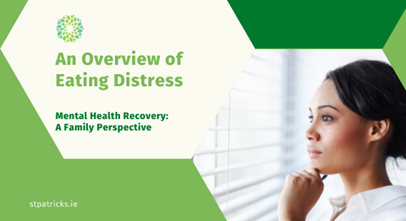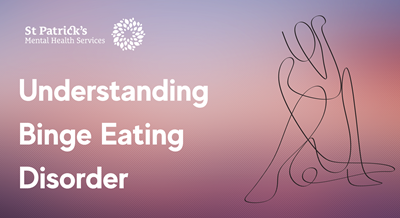Most people base their self-worth on many factors, such as their relationships, work, creativity and so on. However, when you live with an eating disorder, you judge your self-worth entirely or mostly in terms of your shape and weight, and your ability to control these. This unhealthy way of thinking leads to obsessions with and changes in how you eat, exercise and control your weight and shape. When these thoughts and behaviours are strong enough to affect your daily life and relationships, it is a sign that you might need support.
People of all ages, genders and backgrounds can develop an eating disorder, although teenagers and young women are at higher risk.
With treatment, you can recover from an eating disorder. If you are going through an eating disorder, it is important to have the right assessment and treatment as early as possible to help you deal with your physical, nutritional and mental health needs.
What are the types of eating disorders?
The most common types of eating disorders are anorexia nervosa, bulimia nervosa and binge eating disorder. There are other types of eating disorders with a mixed set of symptoms that do not match exactly with one of these more specific disorders.
-
Anorexia nervosa
If you live with anorexia, you try to control your weight by limiting how much food you eat. This leads to a significant and unhealthy amount of weight loss. You are likely to have an intense fear of gaining weight and to think you are overweight even when you are underweight.
-
Bulimia nervosa
With bulimia nervosa, you move through a pattern of eating a lot of food and then trying to rid your body of it to control your weight. You eat large amounts of food in a short space of time and then take action to avoid putting on weight, such as vomiting, using laxatives, dieting or fasting, and exercising too much. You may feel very secretive and ashamed of these behaviours.
-
Binge eating disorder
When you have a binge eating disorder, you eat large amounts of food in an uncontrolled way, or binge, until you are uncomfortably full. You usually do not take action to offset how much you have eaten; in some cases, this may lead to obesity over time. You might feel shame or self-hatred after bingeing. You might also experience depression or problems with alcohol.
-
Other specified feeding and eating disorders
Many people who have an eating disorder are likely to have other specified feeding and eating disorders (OSFED). With OSFED, you can have features of specific eating disorders or other, different symptoms. It may have developed from or turn into another diagnosis, and it is equally serious to other eating disorders.
What are the signs and symptoms?
If you, your friends or family are worried that you have an unhealthy relationship with food or harmful eating behaviours, you may have an eating disorder.
Some common symptoms of eating disorders include:
- following strict diet rules, such as counting calories, restricting how much food you eat, or avoiding certain types of food
- feeling very anxious around meal times
- avoiding eating meals, especially in social settings
- making yourself vomit or using laxatives after you eat
- binge eating
- exercising for long periods of time or with strict routines, and feeling upset if you are not able to exercise
- developing behaviours around your body shape and weight, such as spending a lot of time looking in mirrors, weighing yourself often, and checking or measuring parts of your body
- having a distorted body image, such as thinking and telling others you are overweight when you are normal or underweight
- feeling very unhappy with your body
- focusing on food, such as being very interested in nutrition or preparing food for others but not eating it yourself
- withdrawing from your social life and usual hobbies and interests
- being sensitive to any comments about exercise, food, or body shape and weight
- going through weight loss or weight changes
- noticing changes to or loss of the menstrual cycle
- having swelling around your cheeks or damage to your teeth from vomiting.
If you have an eating disorder, you can go through any mix of these symptoms. You may also have some of these symptoms without having an eating disorder.
In Western countries, between 5% and 10% of young women have some form of eating problems, with up to 3% having an eating disorder.
What causes eating disorders?
There is no single known cause for eating disorders. However, some of the factors below may increase your chances of developing an eating disorder.
-
Genetic factors
Studies suggest that anorexia, bulimia and binge eating disorders are complex genetic diseases. This means that if your parent, full sibling or child has a history of eating disorders, your risk of developing one could rise by 10 times. About one third of the genetic risk for eating disorders, depression, anxiety, and addictive disorders may also be shared.
-
Biological factors
Unhealthy eating behaviours can be triggered by changes in your body during puberty, such as increases in hormones and brain development; the lack of nutrition caused by unhealthy eating may also affect your brain’s development at this time, which leads to these behaviours continuing. Other stressful events – such as a premature or complicated birth – may also increase the risk of developing an eating disorder.
-
Psychological factors
You may be more likely to develop an eating disorder if you:
- have low self-esteem
- find it difficult to express your emotions
- avoid or are afraid of conflict
- have problems with friendships and relationships
- are competitive by nature
- are a perfectionist.
-
External factors
If you have a history of
- teasing or bullying, especially if based on your weight and shape
- physical or sexual abuse
- personal or family obesity
you may be more likely to develop an eating disorder.
Where can I get help for eating disorders?
It can sometimes be difficult to recognise an eating disorder. A person with an eating disorder might be within a healthy weight range, not only underweight or overweight. They may have shame or guilt about their behaviours and go to great lengths to hide them. Some people do not realise they have a problem, and others may not want to give up their behaviours.
However, if you are worried that you or someone you love has signs or symptoms of an eating disorder, it is important to get help.
A good place to start is by speaking to your family doctor, or GP, who can do a health check, talk about your symptoms, and refer you for treatment.
How are eating disorders treated?
You can recover from an eating disorder with the right support.
Early intervention
Eating disorders are complex mental health conditions, often with physical and sometimes life-threatening complications. If you have an eating disorder, it is important to know that the sooner you get help, the better the chance you have of making a full recovery.
Recognising or admitting to having an eating disorder can be a big step. Knowing what to do can feel overwhelming for you and your supporters. It is best to see a medical professional or eating disorders specialist; they will be able to assess you, check how serious your symptoms are and identify the best treatment options with you and your family.
Types of treatment
Treatment options for eating disorders are based on the type and severity of your physical and psychological symptoms. Other factors – like your age, the support networks available to you, and the underlying causes of your eating disorder – can also impact which type of treatment will work best for you.
You may need to see a number of professionals to help you with the different aspects of your symptoms. The main focuses of treatment for eating disorders are:
- nutritional rehabilitation
- physical health management
- psychological and psychiatric, or mental health, management.
The length of treatment needed changes from person to person; you may find a short course of treatment works for you, or you might find that your eating disorder is a longer-term difficulty that needs more time for recovery.
Depending on your needs, you can be treated in different settings, such as being an inpatient in a medical or psychiatric hospital, or through day patient and outpatient programmes. You might also find completing self-help programmes or attending support groups helpful, especially if your symptoms are mild.
Useful resources
Please visit our Frequently Asked Questions page if you would like more information on mental health or our services.
-
Websites
Beat | Beat provides helplines, online support and a network of United Kingdom (UK)-wide self-help groups to help adults and young people in the UK beat their eating disorders.
Body Positive | BodyPositive looks at ways we can feel good in the bodies we have.
Bodywhys | Bodywhys is Ireland’s national voluntary organisation dedicated to supporting the 200,000 people in Ireland affected by eating disorders.
Centre for Clinical Interventions | The Centre for Clinical Interventions is a specialist clinical psychotherapy, research and training service. It also provides user-friendly self-help workbooks for many mental health issues such as eating disorders and low self-esteem.
Academy for Eating Disorders (AED) | A website for professionals, people experiencing an eating disorders and family members.
-
Books
- Anorexia Nervosa| Janet Treasure
- Getting Better Bit(e) by Bit(e)| Schmidt/Treasure
- Golden Cage| Hilde Bruch
- Overcoming Anorexia Nervosa| Christopher Freeman
Check the bookshop in our Information Centre for availability and a wider selection of books.
Continue to…
Personality Disorders



